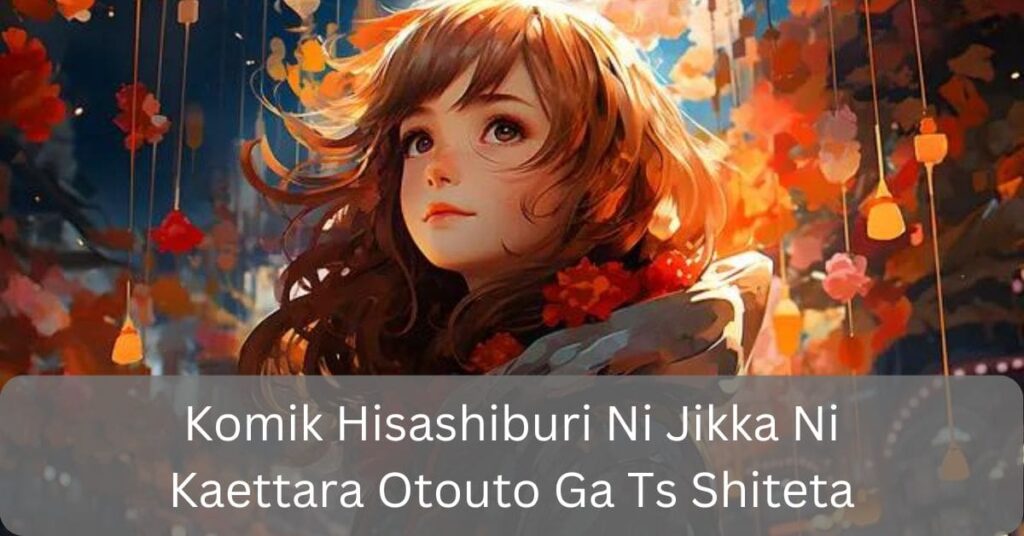Japanese writing and manga have long been celebrated for their ability to capture complex emotions, social nuances, and profound themes within their narratives. Among the myriad of stories that Japanese literature and manga offer, one phrase particularly stands out for its depth and resonance: “Komik Hisashiburi Ni Jikka Ni Kaettara Otouto Ga Ts Shiteta”.
This phrase, which translates to “long time no see, my younger brother had grown” in English, encapsulates themes of family dynamics, personal growth, and the passage of time.
Understanding the Phrase:

“Komik Hisashiburi Ni Jikka Ni Kaettara Otouto Ga Ts Shiteta” is a phrase rich with emotional and narrative potential.
At its core, it tells a simple story of a return home after a long absence, only to find that a younger sibling has grown significantly.
This scenario is a common yet powerful one, evoking feelings of nostalgia, surprise, and a bittersweet recognition of change.
Family Dynamics:
Family dynamics are at the heart of “Komik Hisashiburi Ni Jikka Ni Kaettara Otouto Ga Ts Shiteta”. The return to a family home after a long period away is a moment filled with expectation and apprehension.
How have things changed? How have they stayed the same? These questions are central to the experience described by this phrase.
The relationship between siblings, in particular, can be profoundly affected by time and distance, making the discovery of a younger brother’s growth both a physical and metaphorical revelation.
Personal Growth:
The theme of personal growth is intricately tied to “Komik Hisashiburi Ni Jikka Ni Kaettara Otouto Ga Ts Shiteta”.
The phrase suggests a significant passage of time, during which both the returning individual and the younger sibling have undoubtedly experienced personal development.
This growth is often reflected in physical changes, new responsibilities, and altered perspectives, emphasizing the continuous nature of human development and the inevitable march of time.
The Passage of Time:
The passage of time is a universal theme, one that “Komik Hisashiburi Ni Jikka Ni Kaettara Otouto Ga Ts Shiteta” captures poignantly. Time changes everything-people, relationships, environments.
Returning home after a long period away forces individuals to confront these changes head-on, often leading to a deeper appreciation of the present moment and a more profound understanding of the past.
Nostalgia and Change:
Nostalgia plays a significant role in the emotional impact of “Komik Hisashiburi Ni Jikka Ni Kaettara Otouto Ga Ts Shiteta”. The phrase evokes a longing for the past and a recognition of the inevitability of change.
This duality-cherishing memories while accepting growth-is a common theme in Japanese storytelling, highlighting the delicate balance between holding on and letting go.
Komik as a Narrative Medium:
Manga, or komik, is an ideal medium for exploring the themes encapsulated in “Komik Hisashiburi Ni Jikka Ni Kaettara Otouto Ga Ts Shiteta”.
Through expressive artwork and carefully crafted dialogue, manga can vividly depict the emotions and transformations described by the phrase.
The visual nature of komik allows readers to see the changes in characters, adding an additional layer of depth to the storytelling.
Visual Storytelling:

The phrase “Komik Hisashiburi Ni Jikka Ni Kaettara Otouto Ga Ts Shiteta” lends itself beautifully to visual storytelling. Artists can use changes in character design, environment, and body language to convey the passage of time and the growth of the younger brother.
This visual element enhances the reader’s connection to the story, making the themes of family, growth, and time even more impactful.
Exploring the Complexity of Relationships:
“Komik Hisashiburi Ni Jikka Ni Kaettara Otouto Ga Ts Shiteta” delves into the complexity of sibling relationships. Beyond the initial surprise at seeing a younger brother grown, there lies a deeper exploration of how time apart can shape and redefine these relationships.
The phrase encapsulates the mix of emotions that accompany such reunions-joy at seeing a loved one again, tempered by the realization that they have changed in ways both expected and unexpected.
This exploration of sibling dynamics adds layers of depth to the narrative, inviting readers to reflect on their own experiences of familial bonds and how they evolve over time.
Cultural Significance in Japanese Society:
In Japanese society, the phrase “Komik Hisashiburi Ni Jikka Ni Kaettara Otouto Ga Ts Shiteta” holds cultural significance beyond its literal translation.
It speaks to the importance of familial ties and the reverence for tradition and continuity. The return home after a long absence is a recurring motif in Japanese literature and film, symbolizing a return to one’s roots and a reconnection with one’s heritage.
Through this lens, the phrase becomes not just a statement of personal experience but a reflection of broader cultural values and ideals.
Themes of Regret and Redemption:
Embedded within “Komik Hisashiburi Ni Jikka Ni Kaettara Otouto Ga Ts Shiteta” are themes of regret and redemption.
The realization that time has passed and that loved ones have changed can evoke feelings of regret for moments missed or opportunities lost.
However, the phrase also carries the promise of redemption-the chance to reconnect with family, to bridge the gap that time has created, and to forge new memories together.
This tension between regret and redemption adds a poignant layer to the narrative, underscoring the importance of seizing the present moment and cherishing the relationships that matter most.
Reflecting on Personal Identity:
At its core, “Komik Hisashiburi Ni Jikka Ni Kaettara Otouto Ga Ts Shiteta” prompts reflection on personal identity and growth.
The return home after a long absence serves as a mirror, reflecting not only the changes in others but also the changes within oneself.
It is a moment of self-discovery, as individuals confront how their experiences and choices have shaped them over time.
This introspection adds depth to the narrative, inviting readers to consider their own journeys of self-discovery and the ways in which they have evolved alongside the passage of time.
Symbolism of Homecoming:
“Komik Hisashiburi Ni Jikka Ni Kaettara Otouto Ga Ts Shiteta” carries a profound symbolism of homecoming. Beyond the literal return to a physical place, the phrase represents a return to one’s past, to the familiar comforts and challenges of home.
This homecoming is not just about geography but about reconnecting with one’s roots, grappling with memories both joyful and painful, and finding a sense of belonging in the midst of change.
In Japanese culture, the concept of home holds a deep significance, symbolizing not only a physical space but also an emotional anchor-a place where one’s true self is both nurtured and tested.
Exploration of Intergenerational Dynamics:
An often-overlooked aspect of “Komik Hisashiburi Ni Jikka Ni Kaettara Otouto Ga Ts Shiteta” is its exploration of intergenerational dynamics.
The phrase hints at a broader family context, where relationships extend beyond siblings to encompass parents, grandparents, and other relatives.
The return home after a long absence can reveal not only the changes in one’s siblings but also the changes in one’s parents and the broader family dynamic.
This exploration of intergenerational relationships adds depth to the narrative, highlighting the ways in which family dynamics evolve over time and the role that each generation plays in shaping the family’s story.
Themes of Reconciliation and Forgiveness:

Central to “Komik Hisashiburi Ni Jikka Ni Kaettara Otouto Ga Ts Shiteta” are themes of reconciliation and forgiveness. The passage of time can often bring with it unresolved tensions and conflicts within families, as individuals grow and change in different directions.
The return home becomes an opportunity not only to reconnect with loved ones but also to confront past hurts and misunderstandings.
Through open communication and a willingness to forgive, characters in stories that incorporate this phrase can find healing and reconciliation, strengthening the bonds that unite them as a family.
This theme of forgiveness underscores the importance of empathy and understanding in navigating complex familial relationships, reminding readers of the power of compassion to bridge divides and foster unity.
Conclusion:
“Komik Hisashiburi Ni Jikka Ni Kaettara Otouto Ga Ts Shiteta” is more than just a phrase-it’s a narrative rich with meaning and emotion. It captures the essence of family dynamics, personal growth, and the passage of time, themes that resonate deeply with readers. Through the medium of manga, these themes are brought to life in a way that is both visually and emotionally compelling.
As we explore stories that incorporate “Komik Hisashiburi Ni Jikka Ni Kaettara Otouto Ga Ts Shiteta”, we are reminded of the power of storytelling to reflect our own experiences and emotions. Whether through words or images, these stories connect us to the universal human experience of change, growth, and the enduring bonds of family.
